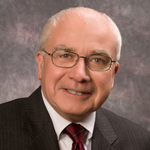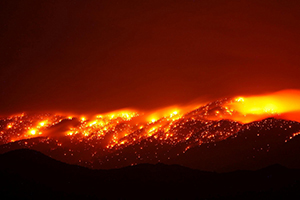By LISA EISENHAUER
Sept. 29, 2020
One small way that Catholic health systems could potentially help address the huge issue of climate change is to reduce their own food waste, says Fr. Tom Nairn.

Fr. Nairn
Fr. Nairn, a Franciscan ethicist and theologian who is provincial minister of the St. Louis-based Franciscan Province of the Sacred Heart, says one study has found that up to 65% of food served in health care facilities goes to waste. A widely cited commentary by Janet Howard, director of the Healthier Hospitals program at Practice Greenhealth says that up to 3 pounds of food per day per bed goes uneaten in hospitals.
Food waste, Fr. Nairn pointed out, produces methane gas in landfills, which, at 25 times the intensity, "is much more problematic than carbon dioxide." Keeping a significant amount of food out of landfills — either by not serving it, by composting it or by diverting it to those who are food insecure — would be a blessing for the planet, he said.
Fr. Nairn, a former senior director of theology and ethics at CHA, offered this suggestion as he shared his thoughts on the challenge of climate change and how it relates to the teachings of St. Francis of Assisi and Pope Francis during a webinar on Sept. 23. The webinar, sponsored by CHA, coincided with the Feast of St. Francis on Oct. 4. CHA has posted reflections, prayers and other resources on its website, chausa.org, to mark the feast day.
Facing a triple threat
Abiding by the teachings of St. Francis and Pope Francis would provide a foundation to address what Fr. Nairn sees as a triple threat that is imperiling the United States: climate change that is driving devastating wildfires and destructive weather patterns, the COVID-19 pandemic that has claimed more than 200,000 lives and the racial injustice that has brought protesters to the nation's streets.

A 2013 wildfire in a section of the Humboldt-Toiyabe National Forest in Nevada lights up the night sky in this U.S. Forest Service photo. Scientists say climate change is fueling wildfires like this one and those that have caused massive damage to parts of Oregon, Washington and California this year.
"The one response, I believe, to all of three those dangers — that response which is the response of St. Francis of Assisi, that is the response of Pope Francis and I hope the response of Catholic health care — is solidarity, understanding that we are all sisters and brothers, human and nonhuman and that we are all truly responsible for all," Fr. Nairn said.
In Fr. Nairn's view, St. Francis' teachings urge mankind to take a kinship approach and look at all of creation as equal in value to ourselves rather than to believe that man has dominion over the Earth or that he is its steward.
"If creation has a value beyond us, as creation is loved by God aside from us, we need to learn to live in relationship with other creatures, each of which has its own intrinsic value," Fr. Nairn said, explaining St. Francis' philosophy.
A communion with nature
Pope Francis has adopted the teachings of his namesake in his own proclamations, Fr. Nairn said. This can be seen, for example, in Laudato Sí the encyclical the pontiff issued five years ago that calls on humans to care for one another and for our common home. "He says we need to have a sense of deep communion with all of nature and that this communion excludes no one or nothing, after Francis of Assisi," Fr. Nairn said.
In short, Fr. Nairn said, both men called for solidarity not just among humans but with all of creation, including "Mother Earth, Brother Sun, Sister Moon and Brother River." The pope wants mankind to make this solidarity personal by undergoing an "ecological conversion" to build relationships with each other, with creation and with God.
To fulfill that ecological conversion on the personal, institutional and societal level, Fr. Nairn said, requires that humans live by ethics, which he defines as "the search for good" and that all of humanity embrace a framework of ethics based on what is good for society as a whole.
Leading the way
Fr. Nairn said that he sees the personal conversion as perhaps the most challenging of the three because it requires humans to change their behavior. Meanwhile, societal conversion has gotten caught in the current political disputes, which he fears have become intractable.
However, he believes institutions such as Catholic health care ministries are in a position to be in the forefront on ecological conversion. "There is an intellectual commitment already there that leads to action," he said.
Actions that institutions can take can have an impact on the triple threat menacing the nation, he said. Reducing food waste, for example, can mean keeping food out of landfills and thus reducing its harmful effects. It can mean shifting that uneaten food to families left hungry amid the pandemic. It can mean providing nutritious food to people trapped in situations that make it hard to find or afford healthy food.
"Perhaps as we deal with this as persons and as institutions, we can finally create the environment, pardon the pun, where we can really experience true societal change," Fr. Nairn said.
A challenge for health care
Fr. Nairn's discussion was introduced by Julie Trocchio, senior director of community benefit and continuing care for CHA. Trocchio said that Catholic health care ministries "are on the frontlines of managing the impacts of climate change as rising temperatures bring ever-more deadly heat waves, wildfires, storms, and flooding and we care for more patients with heat stroke, with heart disease, and asthma, as well as insect-borne disease."
She urged ministries to consider joining the Health Care Climate Challenge issued by the nonprofit Healthcare Without Harm and pledge to help protect public health from climate change.
Trocchio noted that the health care sector has been estimated to be the source of about 10% of all greenhouse gas emissions in the United States. "Health care has a responsibility and we also have an opportunity to act," she said.
Copyright © 2020 by the Catholic Health Association
of the United States
For reprint permission, contact Betty Crosby or call (314) 253-3490.